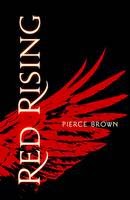So Red Rising, by Pierce Brown is the latest excellent book that I have been getting my teeth into.
In a similar style to The Hunger Games this is a story of an
underdog reclaiming the right to choose his own destiny and hopefully free his
people at the same time.
The novel is set at some relatively distant point in the future;
around 700 years after the superhuman Golds overthrew democracy and instead set
up a system of society based loosely around the Roman pantheon and Roman
republican ideals. The system is stratified by colours, with this caste system
determining everything about your life. At the bottom of the heap are low-Reds
who spend their entire existences toiling away deep under the surface of Mars,
mining for the fuels that they believe will one day terraform the planet
surface. In fact this is a lie, designed to maintain the illusion that they are
not simply the lowest slaves in the universe. Following a terrible injustice
one Red, Darrow, is chosen by a resistance group to infiltrate the higher
echelons of Gold society and start the process of change. His only hope for
doing this is to carve his body and mind into the form of a natural Gold, and
to survive training at The Institute.
This is wonderfully gritty writing that has much to compare
it to the Hunger Games, however it is more than simply a copy reminding me of
the Claudius books by Robert Graves as much as of anything else.. The
characterisation of the central characters is brilliantly done, with a variety
of motivations and backgrounds being explored. Much of the story reads like a
classical epic, with warriors being forced to compete to create a new society
whilst fending off interference from the deeply partisan 'gods'. At the same
time the slow reveal of the corruption at the heart of this apparent
meritocracy adds depth to the story. The society itself seems to be largely
based on Plato's Republic, with each section of society born into it's place
and with the total rejection of Athenian style democracy. However the novel and
the central character of Darrow question the usefulness of this model, while
other characters grow to see flaws in the system as the story progresses. I found the codes of chivalry and honour alongside the more ruthless aspects of this society to be absolutely enthralling and love the whole concept of this Roman/Spartan system being used as a mode of rule in the future. I'm hoping that the next books in the series allow for a continuation of some of the relationships forged here.
As I write this I am thinking of other things that this book reminds me of, a whole range of things from Cornwell's Winter King books, through The Ender's Game series and even GRRM's Song of Ice and Fire. If I'm honest I can easily see that there are links to the universe of the latest Star Trek films also.
This is one of those books where I would be amazed if the film rights are not already being snapped up, it deserves to be taken further, and the visual nature of the story would surely translate well onto film.
The book seems to be listed as a YA read, presumably due to the ages of the central characters, I don't know that I agree with this categorisation. Yes the characters are mainly teens, but for the Reds at least we are talking about a world where you are considered to be genuinely old aged 35, everyone is maturing much faster than in this world, the action and emotions shown are adult in nature and as with The Hunger Games this story translates perfectly for an adult audience. Marking this down as simply a teen read because of the age of the characters would seem to be as silly as listing Song of Ice and Fire as teen because so many of it's main players are teenagers as the story starts.
I must say I am really looking forward to the second part of
this trilogy, which I assume will feature a slightly more direct political bent
than this first book now that Darrow has fully entered manhood as a lauded
Gold, I am looking forward to some real Machiavellian moves coming through as the uprising builds.

No comments:
Post a Comment